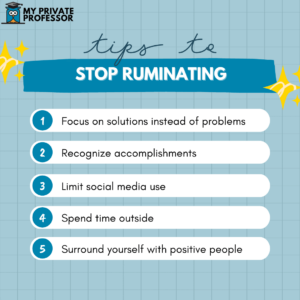When was the last time you sat with your thoughts (and nothing else)?
“Mind-wandering,” otherwise known as daydreaming, is just that. Essentially, it’s when you allow your thoughts to stray from the environment around you and/or the task at hand.
Previously, researchers were under the impression that mind-wandering is, more often than not, disadvantageous for us. However, recent research touches on the fact that mind-wandering is actually a natural part of how the human brain functions.
In fact, research suggests that we spend around half of our waking time engaging in mind-wandering.
Here’s the thing—a lot of the time, as research shows, when we engage in what we think of as mind-wandering, we go to the negative. When this happens, our thoughts tend to continue circling around these negativities. This is rumination. According to Zachary Irving, an assistant professor at the University of Virginia, we need to reframe our perception of mind-wandering.
As Irving notes in one of his papers, there are different types of attention: guided attention ( you feel “pulled back” if someone/someone distracts you), unguided attention (when your thoughts go from one topic to another), and rumination (when you obsessively focus on your anguish).
According to Irving, we should think about mind-wandering as ‘unguided attention,’ distinctive from rumination. He suggests that rumination isn’t mind-wandering, but guided attention, because the mind resists distraction from the distress. Irving ultimately reminds us that mind-wandering may seem purposeless, but in reality, our mind often wanders right over to our goals.
So, Irving explains, mind-wandering can be purposeless in its nature, in that it’s unguided. But at the same time, it’s also purposeful in that it often arises, and (subconsciously) prompted by our goals.
The stigma against daydreaming
In our society, we often think of daydreaming as a bad activity—as overindulging. And who’s to blame us? We’ve evolved into a fast-paced, always “on” society, which means that the more you’re going, going, going, the better. And consequently, we stigmatize daydreaming and taking time to just be with your thoughts. (Those “indulgent” activities, of course, may require you to sacrifice some of the hours you spend grinding to get that overtime compensation.)
Although our societal perception of mind-wandering is that it’s lazy/unproductive, the fact is, many earth-shattering innovations were products of mind-wandering!
For instance…
- Chemist Friedrich August Kukulé claimed that, after dreaming of a snake eating its own tail, he had a vision of the ring structure of Benzene. (Benzene rings are the loops of six carbon atoms which most organic chemical compounds contain.)
- Biochemist Kary Mullis, while driving around his cabin home, was simply thinking, when the idea came to him. He would use a pair of primers to bracket desired DNA sequences and copy it, using DNA polymerase. This is now known as the polymerase chain reaction technique, which is a method for rapidly producing millions of copies of an individual’s DNA segment to further study them.
- After fleeing to London to escape Nazi persecution, physicist Leo Szilard was one day waiting to cross the street, when he suddenly had the thought that a nuclear chain reaction could be possible. This led him to be the first scientist to recognize that nuclear power could be used to build an atomic bomb.
- Reportedly, it was only when he was taking some time to relax in his apple orchard and watched an apple fall that the idea of universal gravitation came to Isaac Newton.
- When J.K. Rowling was stuck on a delayed train traveling from Manchester to King’s Cross in London, she thought of Harry Potter.
The default mode network
When you mind-wander, you activate the default mode network. This is the network of brain regions that is active when you’re not focusing on your immediate surroundings.
When you activate the default mode network, researchers have found that you begin piecing together issues that may be present in your life and finding solutions. In addition, you look to the past and present, which enables you to start imagining, and then preparing for the future (setting goals!). Essentially, your brain helps you make sense of the world around you.
This set of regions is more active during passive tasks than those that require focused, external attention. For instance, the network might be activated when you’re daydreaming, recalling memories, thinking about the future, monitoring your environment, or thinking about others’ intentions. Basically, it’s a set of brain regions that are engaged when you’re “just thinking,” without an explicit thinking goal.
Unfortunately, increasing developments in technology have seemingly dissuaded us from practicing mind-wandering. That is, every minute of every day, different social mediums & notifications are pulling at our attention, encouraging us to stay “on.”
Mind-wandering can boost students’ creativity
Creativity is a valuable tool for students as it empowers them to consider various perspectives, think of multiple solutions, and produce novel ideas. And really, creativity goes hand in hand with being a good problem solver.
In one study, researchers gave participants a creativity test, the Unusual Uses Task, which prompted participants to think up novel uses for everyday items (i.e., fork, pencil, etc.). In the second stage, participants either engaged in an undemanding task (to encourage mind-wandering), a demanding task which took up all of their concentration, or were in a resting period or non-resting period. Afterwards, they took the test again.
The researchers found that those who engaged in mind-wandering during the undemanding task improved their performance on the creativity test significantly more than any other group. This finding suggests that mind-wandering can enhance creativity and problem-solving skills—and that maybe, next time you’re experiencing writer’s block, you should just take a pause and let your mind wander.
According to a more recent metastudy, mind-wandering improves creativity and can significantly help with problem solving and learning. And notably, the researchers suggest that this is also related to planning and delaying gratification.
Currently, artificial intelligence (AI) is becoming increasingly prevalent in our world—by now you’ve probably heard of ChatGPT. As AI products get more and more advanced, there’s more talk of what they’ll be able to do—and namely, which jobs they’ll take on.
But many people consider our creativity to be uniquely human—and something that AI bots will never fully adopt. Thus, it’s more important than ever to nurture creativity and allow students the time to lose themselves in their thoughts.
Evidently, mind-wandering is a good medium to achieve this. And it can also help students with their schoolwork—for instance, if you’re struggling with writer’s block, you may just need a good 20-minute mind-wandering session.
Mind-wandering can increase students’ happiness
It seems that we often forget that different facets of our health can affect our abilities and skills in any situation.
For instance, if you’re really passionate about rock climbing but are feeling glum after getting an upsetting phone call about a family member, you might not perform as you usually do. Maybe all you really want to do is burrow under the covers until you feel a little better.
Similarly, if a student is unhappy, their mood will pretty much inevitably have a negative affect on their academic performance. Maybe they’ll find it hard to stay focused, because their thoughts keep returning to their unhappiness. Or maybe they feel fatigued in class, because as we know, depression can lead to fatigue.
In a 2013 study, researchers regularly pinged participants to see what they were doing, whether or not their minds were wandering, and how they were feeling. They found that if participants’ minds were think about interesting, off-task musings, their moods became more positive.
Seemingly, engaging in some mind-wandering can actually boost students’ happiness. And thus, it can potentially improve their concentration, productivity, and motivation in school.
Mind-wandering can help students set goals
With all that students juggle on any given day (turning in assignments, socializing, meeting with teachers, extracurriculars), it can be difficult to remember what they’re working towards. And it can feel overwhelming to take the time to sit down and think about concrete goals.
Research shows that the more often people engage in mind-wandering during a task, the more they’re willing to wait for a reward afterwards. This is important, because it suggests that mind-wandering may help students delay their gratification. This, ultimately, can help them manage and eventually achieve long-term goals.
Indeed, research does actually show that there’s a link between mind-wandering and fulfilling one’s goals. This may seem counterintuitive, because we tend to think, the more I can get done, the more likely it is I will achieve my goals…
But there’s something faulty about this reasoning. While it is seemingly true that productivity is related to reaching more goals, there’s still a line. There is only so much we can do. And when we get to that line, that’s when we start noticing mistakes, exhaustion, and that inability to focus. So taking breaks, and importantly, mind-wandering, can help refresh our brains and get us back on track after the pause.
Final thoughts
As seen, mind-wandering is a natural brain function—and one that we shouldn’t condemn, but nurture. So remember that mind-wandering is NOT the same thing as rumination. Mind-wandering (‘unguided’ attention) revolves around managing goals and productively solving issues. Meanwhile, rumination is a direct and continual focus on the distress in your life.
Importantly, mind-wandering can help students develop critical skills that will help them succeed in higher education and the workforce.
If we want to empower the next generation, it may be time to reconsider our views on mind-wandering.







